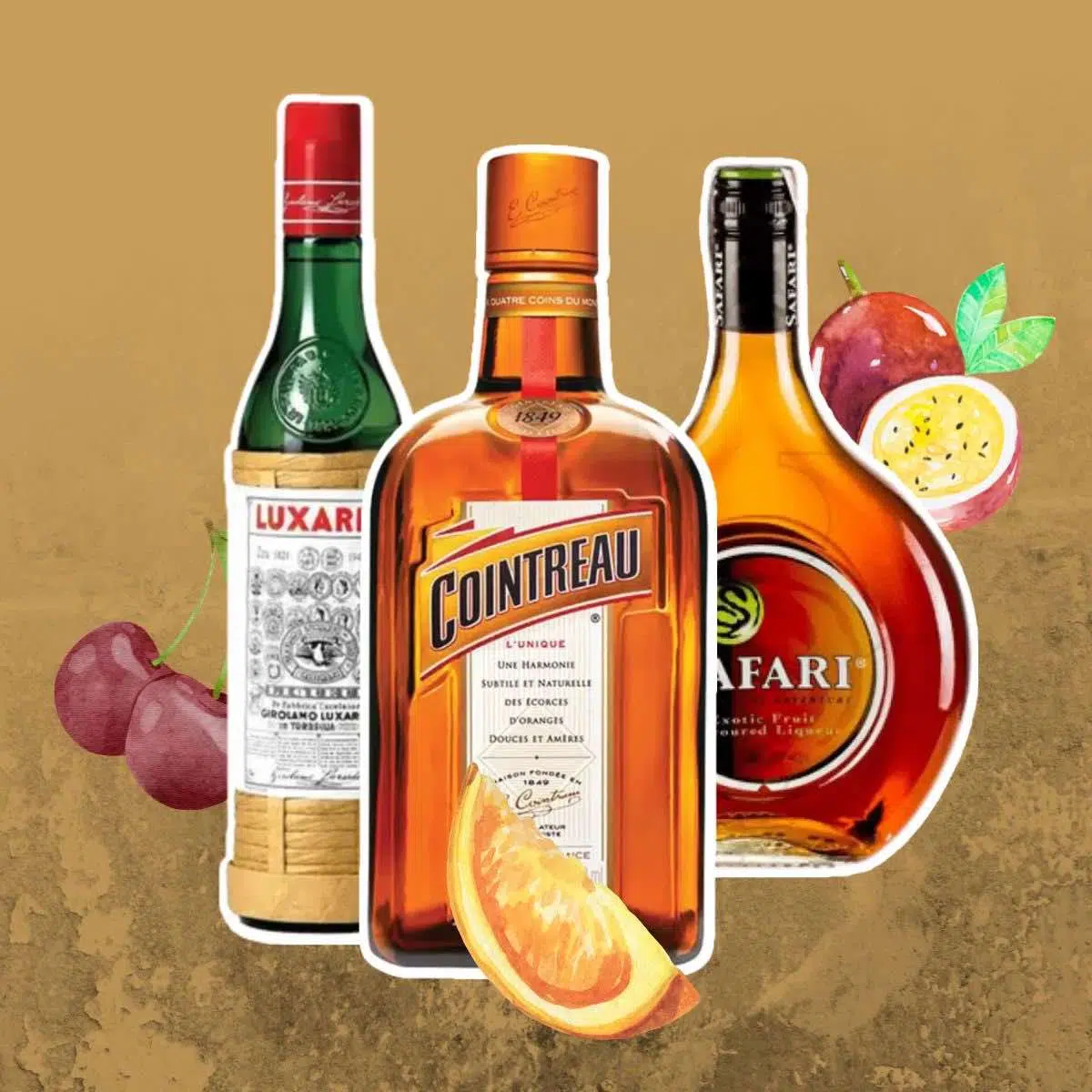When looking at cocktail recipes, you'll often find some kind of liqueurs in the list of ingredients. There are many different types of liqueurs, one of the most important ones are fruit liqueurs. These fruity liqueurs are alcoholic beverages based on a liquor like vodka, gin, or brandy, flavored with fruits and sweetened with sugar or other sweeteners. The amount of alcohol in these fruit-flavored liqueurs typically ranges from 20% to 30% alcohol by volume - with some outliners containing less or more.
Liqueurs made from fruits are not only tasty when served neat. They are an integral part of mixology and are used in many cocktail recipes. Just think of classics like Cointreau, Maraschino liqueur, and Blue Curaçao.
What is a fruit liqueur?
A fruit liqueur is a distilled spirit, flavored with a variety of fruity ingredients and sweetened by adding sugar or other sweeteners. Many of the best fruit liqueurs have an intensely sweet taste, yet in rare cases, you can also come across some drier options.
The variety of fruit that goes into these liquors ranges from cherries, melon, pomegranate, and white peaches, to berries like raspberries, blackberries, blueberries, and strawberries. There are even products flavored with rhubarb. Yes, we know rhubarb is a vegetable, but the USDA classifies it as a fruit in 1947 making rhubarb-flavored liqueurs. part of the category.
How strong is it?
The majority of fruit liqueurs contain around 20% of alcohol. However, the full range of ABVs starts at around 15% and goes all the way up to 40%, sometimes even higher.
How is a fruit liqueur made?
Fruit liqueurs are a delightful infusion of ripe and juicy fruits with alcohol, creating a harmonious marriage of flavors. The process begins with selecting the finest fruits at their peak ripeness, ensuring a burst of natural sweetness and aroma.
These fruits are then macerated or steeped in alcohol, allowing the flavors to infuse and develop over time. Some recipes may include additional spices or herbs to enhance the complexity of the liqueur.
After the infusion period, the mixture is strained to remove solid particles, leaving behind a vibrant and flavorful liquid. Finally, a touch of sugar may be added to achieve the desired sweetness. This whole process takes weeks, and sometimes even months.
Additionally, some products mature in wooden barrels to develop a more complex flavor profile. Some distillers leave the liqueurs to rest for only a month, others let them age for 6, 9, and even 12 months.
15 Best Fruit Liqueurs You Have to Try
Here is our curated list of different types of fruit liqueur, from classic cocktail ingredients like Cointreau and Blue Curaçao to popular digestifs like Ginja and Limoncello.
1. Cointreau Orange Liqueur
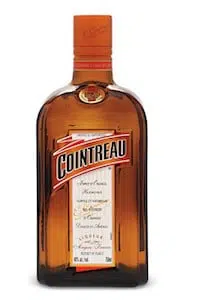
- Produced by: Rémy Cointreau
- Origin: France
- Introduced: 1875
- ABV: 40% (80 proof)
- Fruit: Bitter orange
- Price: $39
Cointreau is a Triple Sec and my go-to option for Margaritas. The colorless, orange-flavored liqueur is a staple in bars and packs quite a punch at 40% ABV.
In return for the high amount of alcohol, Cointreau contains very little sugar for a liqueur. That results in a dry and bittersweet taste of orange.
The fruits used to make this liqueur are green-skinned, bitter oranges. Only the sundried peels of these fruits are used to bring the unique bitter-orange flavor to Cointreau.
2. Grand Marnier Cordon Rouge
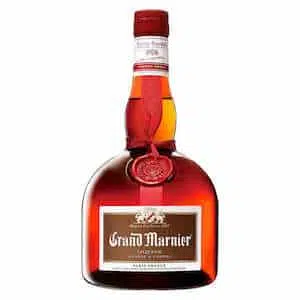
- Produced by: Marnier Lapostolle
- Origin: France
- Introduced: 1880
- ABV: 35% (UK) - 40% (US) (70 - 80 proof)
- Fruit: (bitter) orange
- Price: $39
Grand Marnier, or Grand Marnier Cordon Rouge as the product is called correctly, is another orange-flavored liqueur from France. But other than Cointreau, Grand Marnier is not a classic Triple Sec.
Instead, Grand Marnier is a cross between Triple Sec and Curaçao liqueur based on Cognac. Tastewise, Grand Marnier is comparable to Cointreau but has a richer and more intense flavor profile due to its Cognac base.
The orange liqueur is a popular substitute for Triple Sec in cocktails. It brings more complexity to the drink and adds warmer notes like vanilla, toffee, and nuts.
3. Chambord Raspberry Liqueur
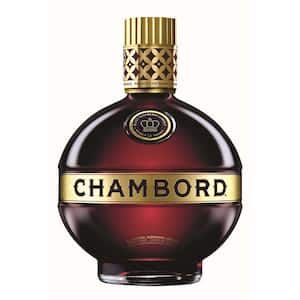
- Produced by: Brown Forman
- Origin: France
- Introduced: 1982
- ABV: 16.5% (33 proof)
- Fruit: Raspberries
- Price: $38
Chambord is a relatively young product released only in 1980, yet it is one of the best raspberry liqueurs you can get. This sweet and intensely fruity liqueur is made from red and black raspberries.
Like Grand Marnier, Chambord is French and also based on Cognac. Yet, Chambord is a lot sweeter and less alcoholic. Containing only 16.5% ABV, it doesn't even bring in half the amount of Grand Marnier.
It's great in combination with Champagne in a Kir Imperial and classic cocktail recipes like the Bramble or French Martini.
4. Maraschino liqueur
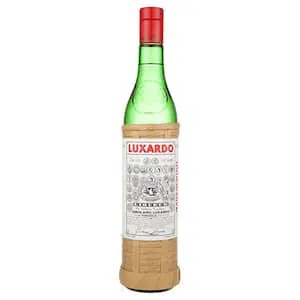
- Produced by: Luxardo
- Origin: Zadar, Croatia, now Italy
- Introduced: 1821
- ABV: 32% (64 proof)
- Fruit: Marasca cherries
- Price: $40
This fruity cherry liqueur from Luxardo is another popular ingredient in cocktails. The fruits used to make this liqueur are marasca cherries. This type of cherry is small, of dark red color, and tastes super sour.
Maraschino liqueur is clear-colored with a bittersweet taste of cherries and hints of almonds. You can drink it neat, but it's best used in a classic Aviation cocktail or a Martinez.
Besides Luxardo, other brands also produce excellent Maraschino. But Luxardo's is by far the bestselling brand.
5. Heering Cherry liqueur
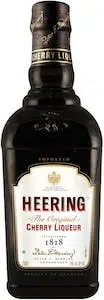
Produced by: DeKuyper
Origin: Denmark
Introduced: 1818
ABV: 24% (48 proof)
Fruit: Cherries
Price: $30
Heering cherry liqueur is one of the most popular cherry liqueurs in the world. The sweet fruit liqueur is still produced after the traditional family recipe.
Heering cherry liqueur has an intense yet natural cherry flavor. You can compare it to a cross between cherry jam and plum jam. The aftertaste also includes hints of almonds that derive from the cherry stones.
The liqueur is sweet, fruity, and super easy to drink. However, it's rarely consumed neat. The better way to use it is in cocktails like the Singapore Sling or Blood & Sand.
6. Ginja or Ginjinha

- Produced by: Various producers
- Origin: Lisbon, Portugal
- Introduced: 1840
- ABV: around 18% - 25% (36 to 50 proof)
- Fruit: Ginja berries aka Morello cherry
- Price: $10 - $20
Ginjinha, also called Ginja, is a traditional Portuguese fruit liqueur made from Ginja berries, also known as Morello cherries.
To make Ginja, the cherries are soaked in aguardiente and flavored with spices like cloves and cinnamon.
This tasty liqueur is very popular in Lisbon and the Algarve region. If you're there, try it in a Ginjinha bar, like Ginjinha Espinheira, Ginjinha Sem Rival, or Ginjinha Rubi.
Ginja is best served neat and meant to be sipped. That way, you can best enjoy the flavor and aroma of this delicate liqueur. However, lately, Ginja is also often used in mixed drinks.
You can find all kinds of twists on classics like Ginja Margaritas, Ginja Mojitos, or even Ginja Old Fashioned cocktails.
7. Limoncello Lemon Liqueur
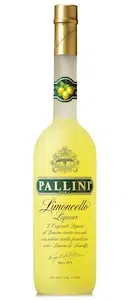
- Produced by: Various producers
- Origin: Italy
- Introduced: Early 1900s
- ABV: around 30% (60 proof)
- Fruit: Lemon
- Price: $14 - $25
Limoncello is a citrussy fruit liqueur commonly served as a digestif in Italy. It's made from a specific type of lemon mostly harvested on the Amalfi coast or the island of Capri.
This sweet, fruity, and tangy liqueur typically contains between 20% - 35% vol. On average, a bottle of good Limoncello should cost you about $20.
Drinking it neat and chilled is, by far, the most common way to consume Limoncello. However, you can also use it in cocktails as a creative way to sweeten a drink.
8. Midori Melon liqueur
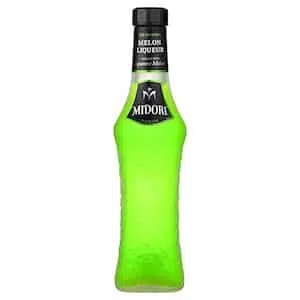
- Produced by: Suntory
- Origin: Japan
- Introduced: 1964
- ABV: 20 - 21% depending on the country (40 -42 proof)
- Fruit: Musk Melon & Yubari
- Price: $24
Midori Melon liqueur was a star during the 80s in the United States. You could find it in every bar, club, and restaurant as its vibrant green color and unique taste perfectly fit the vibe of 80s cocktails. It comes in a flashy and unique glass bottle with a matte finish.
Even today, Midori melon liqueur has no real competition. Whenever you find a drink on a bar menu made with melon liqueur, chances are high that Midori is part of the drink.
The flavors come from two different fruits, the Yubari fruit (or melon) and musk melons. Together they combine for a sweet and subtle taste of melons.
9. Giffard Premium Banane du Brésil
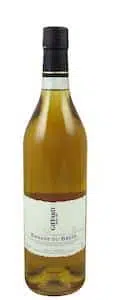
- Produced by: Giffard & Cie
- Origin: France
- Introduced: -
- ABV: 25% (50 proof)
- Fruit: Banana
- Price: $33
Giffard's Banane du Brésil is just one of many excellent banana liqueurs. It's produced by slowly macerating bananas to capture the flavors and aroma of the fruits perfectly.
Blended with a bit of Cognac, the liqueur is see-through with a bright yellow color. The palate is dominated by bananas with a hint of vanilla.
Yet, you can also make banana liqueur at home. Check out this recipe to make a Rum-based banana liqueur with whole fruits.
10. Sloe Gin
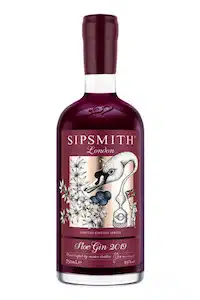
- Produced by: Various producers
- Origin: England
- Introduced: 17th century
- ABV: 20% - 40% (40 - 80 proof)
- Fruit: Sloe berries
- Price: $10 to $35
Sloe Gin is not your typical Gin variation; it's a delightful type of fruit liqueur with a deep red color, sweet taste, and luscious berry flavors. Originating in Britain during the 17th century, this sweet and sour concoction is made by macerating sloe berries in Gin and adding a touch of sugar.
The result is a unique, tart, and aromatic spirit that can be savored neat, in cocktails, or even paired with bubbly for a refreshing twist. You can even try making it at home with a simple infusion process.
11. Safari liqueur
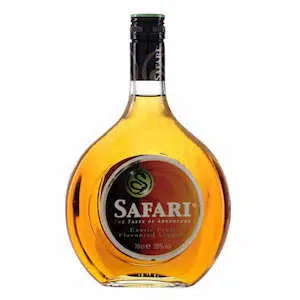
- Produced by: Diageo
- Origin: Netherlands
- Introduced: -
- ABV: 20% (40 proof)
- Fruit: Papaya, mango, passionfruit
- Price: $10
Safari is a sweet and tropical liqueur made from a variety of fruits. Besides papaya, mango, and passionfruit, you can also taste citrus fruits like lemon or lime.
The liqueur contains 20% ABV and is produced in Amsterdam, Netherlands. It's a perfect addition to a glass of sparkling wine but works even better in tropical fruit cocktails.
12. Blue Curaçao
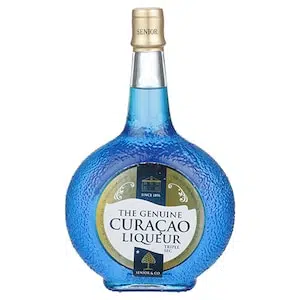
- Produced by: Various producers
- Origin: Flanders & Netherlands
- Introduced: 18th century
- ABV: 15% - 40% (30 - 80 proof)
- Fruit: Laraha orange/bitter orange
- Price: $10 to $35
Blue Curaçao is a popular orange-flavored liqueur famous for its use in bright blue cocktails. In its natural form, the liqueur is colorless. So, to achieve the iconic blue color, artificial coloring is added.
The taste of Blue Curaçao is comparable to Triple Sec. It has an intense orange flavor with bittersweet notes. In comparison, it is slightly less sweet and more bitter than Triple Sec.
13. Passoa Passion fruit liqueur
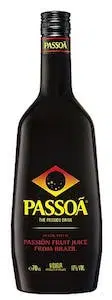
- Produced by: Passoã SAS
- Origin: France
- Since: 1985
- ABV: 14.9% - 20% depending on country
- Fruit: Passion fruit
- Price: $18
Passoã is a very fruit-forward liqueur made with Brazilian passion fruit juice. The red liquid comes in a black bottle and clocks in at 20% in the US. In the UK and other European countries, it's bottled at 17%, and some countries sell it with 14.9% ABV.
The taste of Passoã is very, very sweet and full of fruity flavors. Passion fruit is dominant, but you can also taste other fruits like oranges and even hints of cherry.
Because the liqueur is so sweet, it's most suitable for mixing cocktails. The most popular drink that relies on Passoã is the Porn Star Martini. This famous creation by Douglas Ankrah is one of the best-selling cocktails in the UK. However, it also works nicely as an addition to tropical rum cocktails like a Mojito.
Alternative: Lately, there's a new kid on the block when it comes to passion fruit liqueurs called Chinola. The name refers to the way locals call the tangy fruit - Chee-No-La. This yellow-colored cordial is produced in the Dominican Republic and is made from neutral cane sugar spirit, fresh passion fruit juice, and cane sugar.
What are liqueurs in general?
Liqueurs are alcoholic beverages based on a spirit, sweetened with sugar, and flavored with additional ingredients like nuts, fruits, herbs, flowers, and more.
The base spirit is often a neutral grain spirit, but it could also be any other type of liquor. Brandy (Grand Marnier), Rum (Rum Chata), and Whiskey (Baileys) are just a few examples of this.
There are many different categories of liqueurs and the lines between these are often fluid. There are:
- Coffee liqueurs
- Cream liqueurs Baileys
- Chocolate liqueurs
- Crème liqueurs like Crème de Violette and Crème de Chocolat have a thick, almost syrup-like consistency due to higher amounts of sugar.
- Fruit liqueurs
- Floral liqueurs like Italicus or St Germain
- Herbal liqueurs
- Amaro liqueurs: this is actually a subtype of herbal liqueurs
Most of them are super easy to drink neat but also work great in cocktails or mixed drinks. The high amount of sugar also makes them ideal substitutes for standard sweeteners like sugar, honey, or agave syrup.
We would love to hear your opinion on this topic. Let us know your favorites, and which one we should try or possibly add to the list.
Cheers

